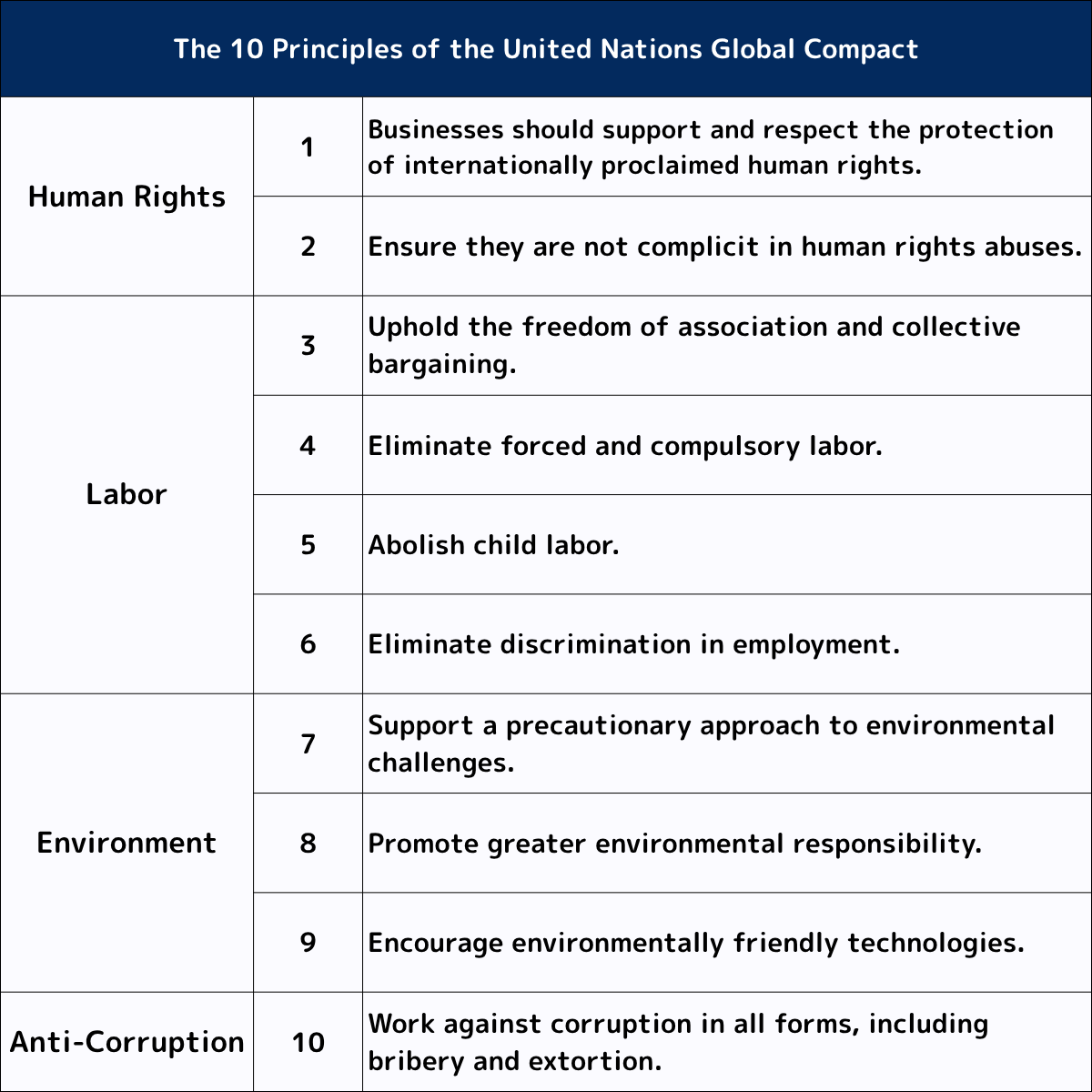- Article Summary
-
Overview
The United Nations Global Compact (UNGC) is the world’s largest corporate sustainability initiative, with over 20,000 participants across 160+ countries. Launched in 2000 by then-UN Secretary General Kofi Annan, the UNGC provides a framework for businesses to align their strategies and operations with ten universally accepted principles in human rights, labor, environment, and anti-corruption. Participation is voluntary but carries strategic weight in today’s global ESG landscape.
Understanding the Ten Principles
The UNGC’s principles are rooted in 4 pillars and 10 principles, based on key UN declarations and conventions:
Human Rights
- Businesses should support and respect the protection of internationally proclaimed human rights.
- Ensure they are not complicit in human rights abuses.
Labor
- Uphold the freedom of association and collective bargaining.
- Eliminate forced and compulsory labor.
- Abolish child labor.
- Eliminate discrimination in employment.
Environment
- Support a precautionary approach to environmental challenges.
- Promote greater environmental responsibility.
- Encourage environmentally friendly technologies.
Anti-Corruption
- Work against corruption in all forms, including bribery and extortion.

Benefits of Joining the UNGC
Enhanced Reputation and Global Credibility
Joining the UNGC signals a commitment to responsible business. For multinational corporations, this enhances brand trust, especially in ESG-conscious markets like the EU and US.
ESG Alignment and Regulatory Readiness
The UNGC framework helps organizations align with evolving regulatory requirements such as the European Union’s Corporate Sustainability Reporting Directive (CSRD), which takes effect from 2025, and the U.S. Securities and Exchange Commission’s Climate Disclosure Rules. These regulations require more detailed and transparent sustainability reporting. Participating in the UNGC provides a strategic advantage by helping companies prepare for these obligations, embed ESG practices into their operations, and streamline their reporting processes.
Access to Tools, Training, and Partnerships
Members benefit from a wide range of resources designed to support their sustainability journey. This includes detailed guidance on aligning with global reporting standards such as GRI, SASB, and TCFD. In addition, the UNGC offers sector-specific roadmaps and practical toolkits to help implement sustainability strategies effectively. Members also have opportunities to engage and collaborate with United Nations agencies, non-governmental organizations, and leaders in the sustainability space, fostering partnerships that drive collective impact.
Risk Management and Long-Term Value Creation
Early alignment with UNGC principles helps in identifying and mitigating risks related to labor violations, environmental incidents, and reputational damage. This fosters long-term business resilience.
Talent and Investor Attraction
Companies with strong sustainability credentials attract top talent and ESG-oriented investors. Being a UNGC signatory serves as a quality mark in due diligence processes.

Case Studies of Impact
Unilever has adopted the UNGC principles as part of its Sustainable Living Plan. This strategy aims to improve health, reduce environmental impact, and raise living standards throughout its supply chain. Unilever has committed to reaching net zero emissions by 2039 and ensuring all suppliers pay a living wage by 2030. These goals demonstrate how the company integrates UNGC principles into its business model.
Microsoft uses the UNGC framework to support its sustainability and ethical practices. The company has pledged to be carbon negative by 2030 and to remove all historic carbon emissions by 2050. It also works to protect human rights in its supply chain through monitoring tools and regular audits, showing alignment with both environmental and labor principles of the UNGC.
Nestlé incorporates the UNGC principles into its sustainability efforts, including promoting deforestation-free supply chains and regenerative agriculture. The company also focuses on improving community nutrition and health. Nestlé reports its progress annually through its Creating Shared Value and Sustainability Report, supporting transparency and continuous improvement.
How to Join the UNGC
Joining the UNGC requires completing a clearly defined process that ensures organizations understand and commit to the initiative’s values. Below are the updated steps based on the latest guidance:
- Preparation and Understanding: Before applying, companies should understand the Ten Principles of the UNGC and ensure leadership is aligned with the initiative’s values. It is important to discuss internally how the company will integrate these principles into daily operations and corporate strategy.
- Letter of Commitment: Draft a Letter of Commitment addressed to the UN Secretary-General, signed by the CEO or equivalent executive. This letter should clearly express the organization’s intent to uphold the Ten Principles and support broader UN goals, including the Sustainable Development Goals (SDGs).
- Online Application: Complete the application form on the UNGC website. You’ll need to provide basic information about the company such as size, sector, contact details, and geographic scope of operations.
- Annual Financial Contribution: Pay the required annual fee, which varies depending on the type and size of the organization. This contribution supports the UNGC’s operational capacity and access to resources.
- Internal Coordination: Designate a point of contact within your company who will coordinate with the UNGC. This person will be responsible for communications, training, and managing reporting obligations.
- Engagement with Local Networks: Join a Local Network if available (e.g., Global Compact USA or Global Compact Network UK). Local Networks provide opportunities for peer learning, region-specific support, and workshops.
- Onboarding and Capacity Building: Participate in orientation sessions offered by the UNGC to understand reporting expectations, available resources, and strategies for effective implementation.
- Communication on Progress (CoP): Within one year of joining, submit your first Communication on Progress report. This annual report discloses how the company is implementing the Ten Principles and contributes to accountability and transparency.
- Continuous Improvement: Stay active in the initiative by participating in events, thematic working groups, and global campaigns. Continuous improvement and innovation in sustainability practices are encouraged to maintain good standing.
Through these steps, companies can formally join a global movement committed to sustainable and inclusive business practices, while receiving support tailored to their industry and region. (e.g., Global Compact USA, Global Compact Network UK) for localized guidance, peer learning opportunities, and region-specific policy updates.
Conclusion
Joining the UNGC is more than a symbolic gesture—it is a strategic move in a world where ESG performance drives business success. For global companies looking to align with sustainability best practices, manage risk, and demonstrate leadership, the UNGC offers a powerful platform backed by the authority and legitimacy of the United Nations.
Why Work with ASUENE Inc.?
Asuene is a key player in carbon accounting, offering a comprehensive platform that measures, reduces, and reports emissions, including Scope 1-3, with expertise in decarbonization. Asuene serves over 10,000 clients worldwide, providing an all-in-one solution that integrates GHG accounting, ESG supply chain management, a Carbon Credit exchange platform, and third-party verification.
ASUENE supports companies in achieving net-zero goals through advanced technology, consulting services, and an extensive network.


